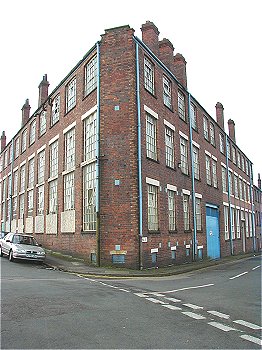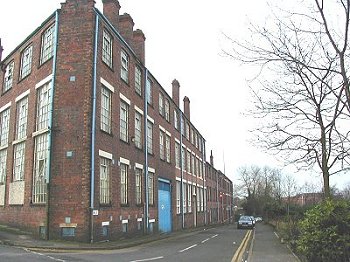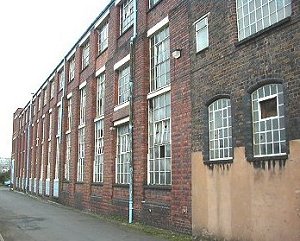| I started in the enamel department aged thirteen and three quarters.
You had to be spoken for to start at Marston's, that was the way of
working. He was a very staunch fella was John Marston, and it followed
through. The following Managing Director, Sidney Bowers, worked the same
way and to get a job there you had to be recommended by someone, or
spoken for. In any case it was a lovely place to work, lovely people,
but you couldn't step out of line. If you were very religious, I was at
the time, I was a chorister and a cross-bearer at St. Mary's, and they
knew all about this and started me right away in the enamel department.
I ended up in the toolroom and liased with different departments and the
drawing office. I had one or two moves while I was there, they were very
good to me and were a family business. |

The factory at the junction of Pool Street
and Paul Street. The large blue doors on the right are top gate. |
Charles Marston wasn't very interested in the
business. I remember him coming to the works one day, riding a
Bamboo bicycle and wearing knicker bockers. He arrived at the
top gate in Paul Street. He wanted to do archaeology, excavating
things abroad. He initially followed in his father's footsteps,
he had to.
He was always at St. Paul's Church, which was at the
back of the works by the Penn Road. The tradition kept on as the
people I worked for, also went there. Sidney Bowers didn't go so
much, but the head designer Cherry Greenwood never missed. We
called him Cherry because of his red nose. If there was a
service on in the day, he would drop whatever he was doing to
attend. I was often in the test house with Tommy de la Hay and them,
changing parts as a kid of about 16 or 17.
If there was anything
on, he would leave what he was doing and go round to the church,
and continue it on his return. Cherry developed outboard motors
for boats. He was a genius. Anything that he was asked to
develop, would be made and working very quickly.
|
| When I first started, the lads or the fellas used to build the frames
and the forks and things by hand, you know. Scallop the tubes, file
them, fit them in, one at a time by hand. I can realise that, working in
the toolroom later in life, that we made big building fixtures, so that
they could just scallop the tube by hand press, put them on, put the
lugs on and pin them, and they would come out as a unit ready for
brazing as it were, rather than just fitting one tube at a time. We made all our own engines from scratch, we made everything bar
wheels and tyres, and things like that, everything was made at
Marston's, from forgings or castings, everything. The wheels were made
somewhere in Birmingham.
In the top yard they used to pull the chain to ring the bull, you had
to be in by 8 o'clock. I don't know how many times I've run up from the
Penn Road off the tram. It used to be three halfpence return down from
Lichfield Street to the factory.
|
| I used to jump off and run up to Paul Street, and
on the top gate was Arthur Fischer who was in charge of
the lodge. There were 6 or 8 clocks that you used to put your
card in and clock on, and you were allowed to clock in until two
minutes past the hour. If you were later than that you had to
stay outside until the lodgeman loosed you in, either a quarter
of an hour or half an hour, whichever he felt disposed to do. If
he was busy you would loose half an hour. He used to be a
sod, he would lock the two big doors, and in one door was a
little wicker gate, that he could put a latch on quickly. |

Another view of Paul Street and top
gate. |
| He used to know that bull was blowing, he used to be on that gate,
I'd be running up towards it, past the pub on the corner, the Swan With
Two Necks, and on the other corner was the Bloomsbury where they all
used to get drunk on a Friday night. I used to be running up here and he
would see you running around that corner and he would know that you
could possibly get in before the two minutes. He would slam the gate on
you. You then had to go into his lodge and sign a book and say why you
were late. You had to be at your bench before that quarter of an hour
was up, if you were quartered, or half an hour if that's what you lost.
You had to be at your bench ready to start. The foreman would say "Oh
you're late again are you, get by your bench". |
|

The Works from Jeddo Street.
|
I was religious, I didn't go boozing, I never went
in a pub. On Friday night we used to leave at six o'clock and
you would be waiting outside a little window in the main yard.
The bloke from the wages office would come and have a row of
tins, and shout your works number, and say "Get you're money".
You would get your tin, count your money and throw the tin in a
box, and go home.
Some blokes stopped in pubs because they were
happier and cleaner than they were at home, and got more to look
to, and more enjoyment. |
| I've seen fight after fight after fight in the Swan With Two Necks or
the Bloomsbury. And many times have their wives come and begged of
somebody like me who was standing watching. "Oh could you help me, he
won't bring me any money", or "he's in the Swan With Two Necks, could
you go and get some money off him". They would spend all of their money
before they went home, it was terrible. A lot of poverty. They would
come home, didn't like their tea, throw it on the fire, and go out
again. Or they would save what money they had got, and it would go to
the bookie, who used to be in the nearest entry down the street. The
bookies used to stand in the entries you see, and they would go and have
a bet, a 6d bet, 4d bet or whatever. |
|

|
|
 |
|

|
|
Return to the
Beginning |
|
Return to
Working Life |
|
Proceed to the
Enamelling Shop |
|